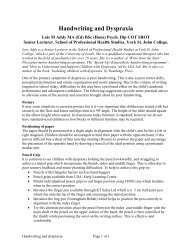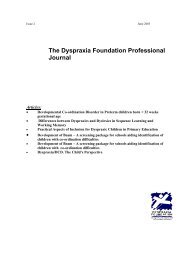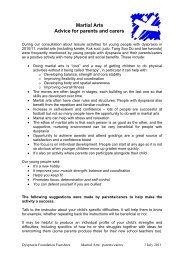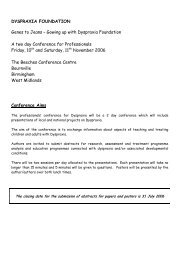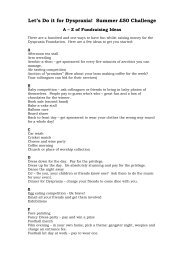Seeing Your Way Through: - Dyspraxia Foundation
Seeing Your Way Through: - Dyspraxia Foundation
Seeing Your Way Through: - Dyspraxia Foundation
You also want an ePaper? Increase the reach of your titles
YUMPU automatically turns print PDFs into web optimized ePapers that Google loves.
• They could try to make as much noise as possible so someone could hear and get help, this<br />
can be useful as the bullies run the risk of being caught. They could fight back and escape<br />
as quickly as possible and run for help. What they decide to do will probably depend on<br />
what is happening at the time.<br />
• Make sure they are encouraged to tell what has happened as soon as possible.<br />
• Boost their confidence by telling them “You can do this really well“. Credit them for<br />
things they do well, for trying and acknowledge that they have fears. Don’t say, “Stop<br />
being silly” or “Pull yourself together”. They will get their confidence back – but in their<br />
own time.<br />
• Threatening the bully yourself, while occasionally being successful, probably isn’t a good<br />
idea. The bully may just decide to pick on another child for a while. It can also be very<br />
embarrassing for a child if they have to have their parents sort out their problems. A child<br />
with a learning disability may have enough to cope with, without the whole school<br />
knowing that there is yet another thing they are unable to deal with themselves!<br />
• Encourage them to take part in other activities such as drama clubs, youth clubs or sports<br />
groups. Be aware that they may have difficulties that influence the suitability of some<br />
groups. They will not want to be placed in another situation where there is a high<br />
likelihood of failure. It is better to build on something they are interested in and like, such<br />
as drama or first-aid, rather than enrol them in self-defence classes for instance.<br />
What can schools do about bullying<br />
There have been many methods introduced over recent years, both in this country and others, in<br />
an effort to reduce the incidence of bullying in schools. The introduction of school bullying<br />
policies has become more common and many schools will have a policy in place. Any school<br />
should have an established method of dealing with bulling.<br />
Contact your child’s teacher. Ask them to investigate the situation and inform you and the head<br />
teacher of the results of the investigations. Make sure that you have as much information as<br />
possible and write down all the questions you want to ask. It helps if you can keep a diary of the<br />
different events with all the details written down, including any witnesses. You should also keep<br />
a record of your meetings with the school.<br />
Stress to the school that you want the matter taken seriously. Do not accept excuses or attempts<br />
to put the blame onto your child. If you feel it is necessary, ask for increased supervision at<br />
breaks or for a safe place that your child can go to if they feel threatened.<br />
A first step is usually to get both sides of the story. If there have been a lot of incidences of<br />
bullying, it may be that other children have seen things and they will need encouragement to talk<br />
to the teacher about it. If your child knows the names of children who might have seen<br />
something, they should be given to the teacher to investigate further. It is usual to then bring the<br />
parents of the bully and the bullied child separately, into school to discuss the situation. Once<br />
discussions have taken place with all parents, the school should keep everybody informed of the<br />
outcome of the investigation.<br />
Bullying – A guide for parents Page 4 of 6




